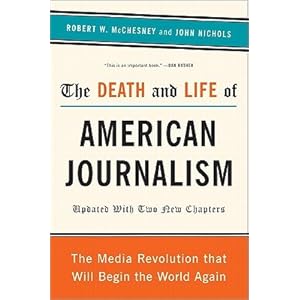I’ve talked briefly recently about the “future of news.”
I’ll talk about it some more.
But I should explain what I mean by that phrase.
I mean something different from what the cyber-hucksters mean by it.
By “news,” I specifically mean:
- Original reporting and storytelling, by people who are paid a living wage for their knowledge, their writing acumen, and their research skills.
Therefore, by “the future of news,” I’m talking about ways to fund professional reporting, particularly on a local/regional level.
Therefore, I am not talking about:
- Aggregation sites and apps.
- The latest flavor of social-media gimmickry.
- Comment threads and chat boards.
- For-profit websites built around unpaid or sub-minimum-wage contributions (reader blogs, “Examiners,” content farms).
- Search-engine gaming or other gimmicks to ginny up page views (presuming online ad revenue will follow).
•
 Ex-Seattleite (and Rocket music mag cofounder) Robert McChesney has been a longtime scholar and observer of the media biz.
Ex-Seattleite (and Rocket music mag cofounder) Robert McChesney has been a longtime scholar and observer of the media biz.
McChesney’s and John Nichols’ 2010 book The Death and Life of American Journalism attempts to figure out what to do.
McChesney and Nichols, like many other commentators, note in great detail how the old-media industries of newspapers and local broadcasters are withering and, in some cases, dying off.
But they also note that the “new media” business model, putting everything up online for free and hoping web ads will pay the bills, is also not working.
And they conclude, as I have, that web ads are never going to work. No matter how frenetically you play the page-view game. No matter how thinly you dilute a site’s professional content with amateur and aggregated freebies.
At least they won’t work at supporting professional local reporting, which is what McChesney, Nichols, and I care about.
So what do they suggest?
Federal subsidies!
In McChesney and Nichols’ ideal future, newspapers and news sites would turn themselves into nonprofit or “low profit” organizations. Then they’d apply for a share of maybe $30 billion in “public media” grants, to be awarded on the basis of need and public service.
Yeah. From a U.S. government that can’t even supply more than a trickle of what public broadcasting needs, and gets bashed by right wing sleaze-mongers for even that.
McChesney and Nichols’ solution reminds me of certain early ’70s radical and feminist manifestos, in which every prescription for a better society began with the phrase “The federal government should…”.
Not practical then. Not practical now.
The search continues.
•
Elsewhere, Arianna Huffington has come out with a diatribe against one of the cyber hypesters’ newest obsessions du jour: the insistence that every single news article must be contrived to “go viral” on Twitter n’ Facebook, and that news orgs must think more about “social media integration” and less on, you know, actual news. Of course, she then admits her own outfit’s just as taken in by the madness as the rest of ’em.